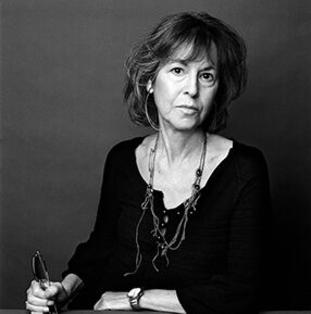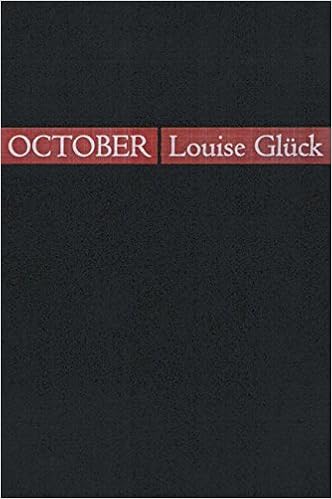October (section I)
Is it winter again, is it cold again, didn't Frank just slip on the ice, didn't he heal, weren't the spring seeds planted didn't the night end, didn't the melting ice flood the narrow gutters wasn't my body rescued, wasn't it safe didn't the scar form, invisible above the injury terror and cold, didn't they just end, wasn't the back garden harrowed and planted— I remember how the earth felt, red and dense, in stiff rows, weren't the seeds planted, didn't vines climb the south wall I can't hear your voice for the wind's cries, whistling over the bare ground I no longer care what sound it makes when was I silenced, when did it first seem pointless to describe that sound what it sounds like can't change what it is— didn't the night end, wasn't the earth safe when it was planted didn't we plant the seeds, weren't we necessary to the earth, the vines, were they harvested?
October (section I) by Louise Glück - Poems | poets.org
---
The entire poem continues like that–short lines, tall poem. And the there is a horrible sensation of after-violation sliding down the poem:
Violence has changed me . . . (repeated twice in part II)
everything that was taken away . . .
you can’t touch my body now.
It has changed once, it has hardened . . .
My body has grown cold . . .
balm after violence . . .
Tell me I am living,
I won’t believe you.
Death cannot harm me
more than you have harmed me . . .
the light has changed . . .
you will not be spared . . .
the unspeakable//has entered them . . .
I strained, I suffered . . .
So much has changed . . .Yes, something has happened, and I don’t just think it is the harvest. Because of the form of the poem, and some of Glück’s references, it seems something very tall has come down, or collapsed. Something that was once there no longer is:
They eye gets used to disappearances . . .
Above the fields,
above the roofs of the village houses,
the brilliance that made all life possible
Become the cold stars.Glück might be talking about an object, a tall structure (or structures, if you notice the plural is used in the relation between the words “disappearances” and “become”), or she might be talking about ideals (as she refers to often in part IV). She might be talking about both. Whatever the case, she uses the barren-field association of the month of October as representation of something monumental that no longer exists on the horizon. A careful reader will note that October obviously comes after September, and that two monumental somethings fell once in the month of September. Glück does spy a kind of hope though, as she leaves the poem on a positive note
my friend the moon rises:
she is beautiful tonight, but when is she not beautiful?This Review first published in: Gently Read Literature

The author of numerous collections of poetry, Louise Glück is the recipient of the 2020 Nobel Prize in Literature, served as a Chancellor for the Academy of American Poets, and twas the Library of Congress’s poet laureate consultant in poetry.
Louise Glück

Glück c. 1977
Born Louise Elisabeth Glück
April 22, 1943 (age 77)
New York City, U.S.
Occupation
Poet
essayist
professor
Education
Sarah Lawrence College
Columbia University
Period 1968–present
Notable works The Triumph of Achilles (1985)
The Wild Iris (1992)
The third annual edition of Sarabande’s Quarternote Chapbook Series.
"Identifying with the season of autumn, the dark of it, the barren, irreversible future of it, and the beauty of it, which is not seen as redemptive, the voice of Louise Glück is starker, more direct, more emotionally charged than it has ever been. October is a masterpiece."—Mark Strand
Louise Glück is the author of nine books of poetry. Her many honors include a National Book Critics Circle Award, a Bobbitt National Poetry Prize, a Pulitzer Prize, the first annual New Yorker Magazine’s Readers Award, an Ambassador’s Award, a William Carlos Williams Award, a Lannan Literary Award, a PEN/Martha Albrand Award for Nonfiction and a Bollingen Prize for Poetry.
Robbins, Michael. "The Constant Gardener: On Louise Glück". Los Angeles Review of Books. Archived from the original on August 7, 2020. Retrieved April 7, 2020.
Chapbooks[edit]
- The Garden. Antaeus Editions, 1976.
- October. Sarabande Books, 2004. ISBN 1-932511-00-8
In 2004, in response to the terrorist attacks of September 11, 2001, Glück published a book-length poem entitled October. Divided into six parts, the poem draws on ancient Greek myth to explore aspects of trauma and suffering.[38] That same year, she was named the Rosenkranz Writer in Residence at Yale University.[39]

The term "chapbook" is also in use for present-day publications, commonly short, inexpensive booklets.[6]
https://en.wikipedia.org/wiki/Chapbook
チャップ・ブック(Chapbook)は、主に17世紀から19世紀にかけてイギリスで発行されたポケットサイズの本。低価格で、内容は大衆向けの文学や実用的なものなど様々であり、19世紀の書物収集家によって名付けられた。
16~24ページ程度で、内容は伝承的な物語や詩、童話、政治的、宗教的なもの、料理、恋愛、旅行、占いなどのハウツー、ユーモア、暦など多彩であり、版画による挿絵も付いていた。 価格は1ペニー前後で、古くは「ペニー・ヒストリー(Penny history)」とも呼ばれていたが[1]、Chapbookという名は、行商人(Chapmen)が売り歩いたことによるとも、古英語で商売を意味するceapがなまったという説もある[2][3]。現代でも、40ページ以内で詩などの出版物もこの名で呼ぶことがある。
沒有留言:
張貼留言
注意:只有此網誌的成員可以留言。